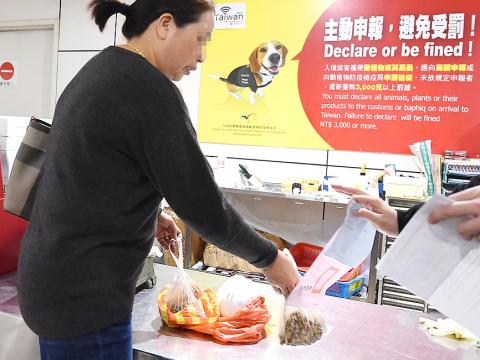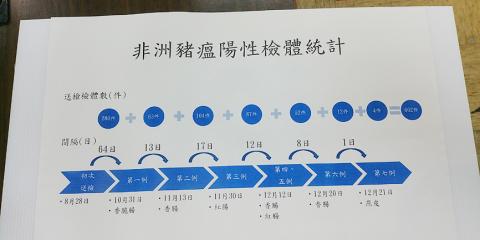Another sample taken from a Chinese meat product intercepted by customs officials has tested positive for African swine fever, the Council of Agriculture (COA) said yesterday, as it reaffirmed its resolve to prevent the virus from entering Taiwan.
The sample in question came from confiscated yanpi (燕皮), a type of wonton wrapper made from pork that is popular in China’s Fujian Province, COA Deputy Minister Huang Chin-cheng (黃金城) said.
Among 602 Chinese meat products sent for testing, it was the seventh sample confirmed to contain the virus, he said.

Photo: Chu Pei-hsiung, Taipei Times
Port of Taichung officials on Sunday intercepted a Taiwanese traveling from Fujian by ship, Huang said, adding that the yanpi was just one of the illegal products they were carrying.
The other six samples that tested positive for the virus were confiscated from Oct. 31 to Thursday, and came from sausages produced in China’s Liaoning, Heilongjiang and Sichuan provinces, as well as Macau, council data showed.
Although China as of yesterday was said to have reported 99 cases of African swine fever across 23 provinces, the number seems “meaningless,” given that China tends to conceal facts, Huang said, adding that the actual number might be 100 times more.

Photo: Chien Hui-ju, Taipei Times
First-time offenders caught with pork from virus-infected areas face a fine of NT$200,000 (US$6,494), while those who are repeat offenders face a maximum fine of NT$1 million, the council said.
No Europeans, Americans or Japanese have been caught carrying illegal meat products, said Huang, who earlier this week told reporters that most of those caught have been Chinese or Vietnamese spouses traveling on Republic of China (Taiwan) passports.
“Eating Chinese meat products is not good for one’s health” as the products could be made of meat cut from virus-infected pigs, he said.
The council has previously said that the virus, although deadly for pigs, cannot affect humans.
The council earlier this month said that Taiwan would join the World Organization for Animal Health’s East Asian task force for combating the spread of the disease and that the first meeting could be scheduled “at the beginning of next year.”
The council has not yet received any notice confirming the meeting’s venue and time, Bureau of Animal and Plant Health Inspection and Quarantine Deputy Director-General Tu Wen-jane (杜文珍) said.
However, the meeting would be an important occasion for officials from Taiwan and other Asian countries to exchange information about the disease, she added.

‘DENIAL DEFENSE’: The US would increase its military presence with uncrewed ships, and submarines, while boosting defense in the Indo-Pacific, a Pete Hegseth memo said The US is reorienting its military strategy to focus primarily on deterring a potential Chinese invasion of Taiwan, a memo signed by US Secretary of Defense Pete Hegseth showed. The memo also called on Taiwan to increase its defense spending. The document, known as the “Interim National Defense Strategic Guidance,” was distributed this month and detailed the national defense plans of US President Donald Trump’s administration, an article in the Washington Post said on Saturday. It outlines how the US can prepare for a potential war with China and defend itself from threats in the “near abroad,” including Greenland and the Panama

A wild live dugong was found in Taiwan for the first time in 88 years, after it was accidentally caught by a fisher’s net on Tuesday in Yilan County’s Fenniaolin (粉鳥林). This is the first sighting of the species in Taiwan since 1937, having already been considered “extinct” in the country and considered as “vulnerable” by the International Union for Conservation of Nature. A fisher surnamed Chen (陳) went to Fenniaolin to collect the fish in his netting, but instead caught a 3m long, 500kg dugong. The fisher released the animal back into the wild, not realizing it was an endangered species at

The High Prosecutors’ Office yesterday withdrew an appeal against the acquittal of a former bank manager 22 years after his death, marking Taiwan’s first instance of prosecutors rendering posthumous justice to a wrongfully convicted defendant. Chu Ching-en (諸慶恩) — formerly a manager at the Taipei branch of BNP Paribas — was in 1999 accused by Weng Mao-chung (翁茂鍾), then-president of Chia Her Industrial Co, of forging a request for a fixed deposit of US$10 million by I-Hwa Industrial Co, a subsidiary of Chia Her, which was used as collateral. Chu was ruled not guilty in the first trial, but was found guilty

DEADLOCK: As the commission is unable to forum a quorum to review license renewal applications, the channel operators are not at fault and can air past their license date The National Communications Commission (NCC) yesterday said that the Public Television Service (PTS) and 36 other television and radio broadcasters could continue airing, despite the commission’s inability to meet a quorum to review their license renewal applications. The licenses of PTS and the other channels are set to expire between this month and June. The National Communications Commission Organization Act (國家通訊傳播委員會組織法) stipulates that the commission must meet the mandated quorum of four to hold a valid meeting. The seven-member commission currently has only three commissioners. “We have informed the channel operators of the progress we have made in reviewing their license renewal applications, and